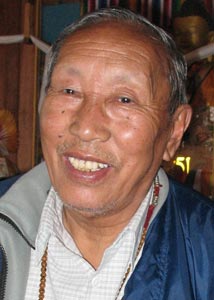Name: Tashi Phuntsok
(Alias: No)
Gender: Male
Interview Age: 73
Date of Birth: 1934
Birthplace: Gyangtse, Utsang, Tibet
Year Left Tibet: 1959
Profession: Business, Dairy Farming
Monk/Nun: No
Political Prisoner: No

Interview No.: 14
Date: 2007-06-27
Language: Tibetan
Location: Lugsung Samdupling Settlement, Bylakuppe, Karnataka, India
Categories: Culture and History
Keywords: childhood memories, Chinese -- first appearance of, Chinese -- oppression under, Chinese rule -- life under, clothing/weaving, education, escape experiences, farm life, Utsang
Summary:
Tashi Phuntsok was born in Gyangtse to a farming family. As a child, he enjoyed loving parents and the opportunity to learn how to read and write. His education ended abruptly with the death of his teacher and his parents had him learn tailoring instead.
Tashi Phuntsok's story reveals different aspects of the Tibetan way of life, including the Tibetans' concept of marriage and the marriage ceremony. He explains, for example, that when he married, rather than bring home his bride, he became a makpa 'man living with his wife's family after marriage.' Tashi Phuntsok shares other views on agricultural practices, weaving, and birth control in Tibetan society.
Tashi Phuntsok describes how his life changed when the Chinese arrived in Tsang after annexing Chamdo sometime in 1954 or 1955. He gives a vivid account of how, in the name of helping poor Tibetans, the Chinese forced wealthier Tibetans to hand over their possessions, including clothes, grains, and grass for their horses. If they did not comply Tashi Phuntsok's family might have been beaten or imprisoned. His family escaped one night to Bhutan and Tashi Phuntsok says he was extremely sad to leave his country. From there they traveled to Missamari in Assam and eventually settled in Bylakuppe, India.
Interview Team:
- Marcella Adamski (Interviewer)
- Lhakpa Tsering (Interpreter)
- Jeff Lodas (Videographer)

